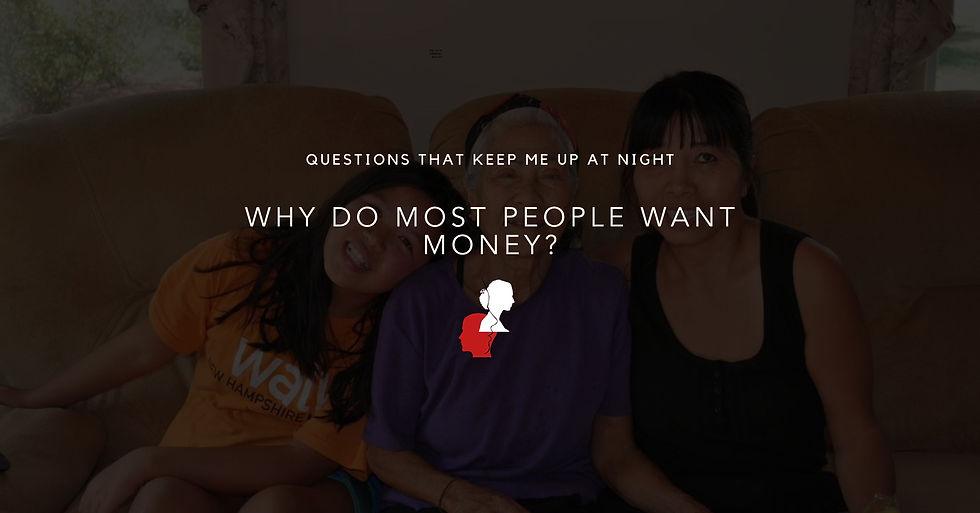Why do most people want money?
- Laura Gainor
- Jul 25, 2023
- 4 min read
A few weeks ago a majority of you voted to learn why people want money and if it’s different for men and women.
We started off this blog series talking about why you should want money, but this week we're focusing on why most people actually do.
I think this is the most complex and interesting subject I’ve ever explored on my blog. I hope you walk away from this week having a better understanding between money, desire and power.

The relationship between money and desire is complex because what we desire as people is complex. What’s clear is that most of us do want money, and according to Forbes we want money second to happiness and before freedom and peace.
Susan Hirshman, a banker with J.P. Morgan Private Wealth Management in New York said "For women, money is about a lifestyle, while for men it can be more about winning and losing. That's a key difference I see playing out every day,"
It’s an interesting observation from an expert, but more research needs to be done on why women and men want money.
I read other articles and listened to videos with opinions ranging from “men want money so they can get more sex” to “women want money for security.”
This echoed with me to some extent, especially when thinking about supply and demand, but I’m not sure how true this is anymore in Western society with rapidly evolving gender roles.
I read many other articles this week claiming different reasons why people want money. Again, the actual research on this subject is… shaky, and that’s the word I use trying to be more palatable than butter on toast, but there were some common themes I observed.
Some articles stated people want money to be happier, some articles stated people want money to gain power and some articles stated people want money to buy material objects, however, despite being different, what I believe these desires and the desires listed before have in common is the face they are desires. People only desire things they don’t believe they have enough of, and it seems people believe that whatever they desire, money would get them more.
Is it true that money will get you more of what you desire?
Yes. Absolutely I think it’s true.
In past blogs on the relationship between happiness and money I shared information about the myth that happiness maxes out at an arbitrary number every year. Money can also get you more power in society as well if you use it correctly, and obviously- money can buy you more things.
Some people can sweet talk, work hard, outsmart or physically overpower people to get their desires, but money can do these things at any time in any place, and money doesn’t diminish with time the way human skills do if you’re investing correctly.
So if money can get you more of what you’re searching for, the question is, is more of what you desire actually better?
The answer here depends on who we’re talking about. Would it be better for you to have more of what you desire? I’d reckon to say yes, but it’s important to recognise when more becomes too much.
At the point where individual wealth traps other people, more is still better for you, but I don’t think more at the point of too much is better for other people, especially if you’re taking from them to the point where they don’t feel they have enough.

Like I said before, money is power. If we look at human hierarchy, those with the most power are on the top, which means other people are at the bottom. I’m not saying this is wrong or right, to some extent I believe this is a part of human nature, especially in societies dominated by masculine energy, but if you feel like you’re not at the tippy top of that pyramid, you can protect yourself.
How can you protect your coin?
Money seems straightforward at first glance, because numbers seem straightforward at first glance, but in a world filled with hidden various motivations there will be a lot of people who will manipulate simple equations like adding two and two to make four.
You’ll find people in this world will start creating complicated equations and telling you it equals four to hide mistakes. Most people don’t have the time or academic foundation to double check complicated equations that should be simple.
Don’t let people fool you with overcomplication. If you don’t understand what someone is saying, especially when it comes to money, don’t trust them. Any expert in their field should be able to explain concepts in a way an adult will understand.
Lastly, don’t make common mistakes people who don’t have money make when they get some.
What are these mistakes?
That’s a question for next week ;)
Enjoyed this post?
Make sure you subscribe to my email list so you don't miss next week's post, and thank from the bottom of my heart for reading!
Tune in next week where we'll explore another question keeping us up at night.



Comments